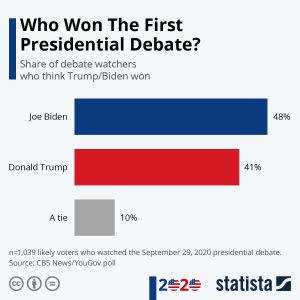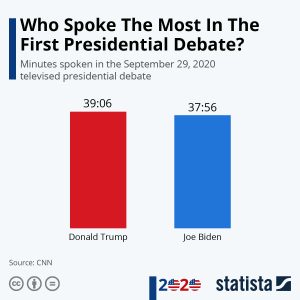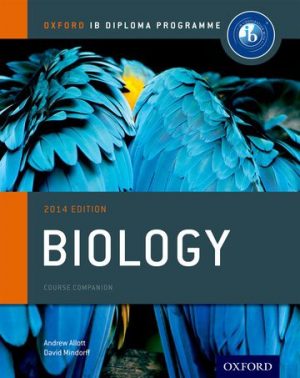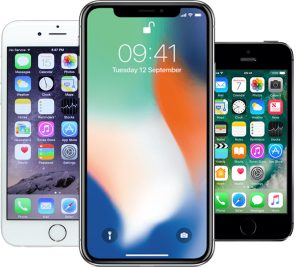The first Presidential debate, or, and hour and a half of chaos
September 30, 2020
Didn’t watch the debate? Don’t worry, the Northern Light is here to sum up the hour-and-a-half long chaos.
The debate begins with a Fox News anchor, Chris Wallace, greeting debate spectators. The presidential nominee for the republican party, President Donald Trump, stands on the viewers’ left and the democratic nominee, former Vice President Joe Biden, stands on the viewers’ right.
Chris Wallace immediately begins with the first topic: the Supreme Court.
In late September of 2020, Trump had nominated judge Amy Coney Barrett to take the place of the late Ruth Bader Ginsburg. Trump believes the Constitution backs up his decision to nominate her so close to the election and that she is more than qualified for the position, but Biden believes this is an abuse of power and that the winner of the election should make the appointment – a case that Republicans made in 2016 with President Obama’s Supreme Court nominee Merrick Garland. Additionally, Biden also states that he has an issue with Barrett’s belief that the Affordable Care Act—more commonly known as Obamacare—is unconstitutional. He states that getting rid of Obamacare will strip 20 million people of healthcare. Trump contradicts this statement by telling Biden that he will strip 180 million people of their private health care if the ACA remains intact. Biden responds with “that is simply not true,” and explains that he wants to virtually expand Obamacare, leaving private healthcare as an option.
Wallace moves onto the next topic by asking Trump what his healthcare plan is.
Trump states that he will be cutting pharmaceutical drug prices by 80-90%—which he states is something that no president has ever done. He re-states that Biden’s plan to expand Obamacare will end private insurance.
Biden responds by saying that Obamacare only goes to people who are so poor that they qualify for Medicaid. Anyone who qualifies for Medicaid would automatically be enrolled in this, but the vast majority of the American people would not qualify. This means that private healthcare would still be a thing. Biden re-states that Trump would be taking Obamacare from millions of people that need it.
Trump responds that he wants to provide better healthcare for the American people, not completely strip away every public healthcare option. To this, Biden says that Trump has no plan for healthcare at all—that, although he has been promising to reform healthcare since he got elected back in 2016, he has no actual plan. By this point, the candidates are fully talking over one another.
Wallace progresses to the next topic: COVID-19. His question for the two candidates: “Based on what you have said and done so far, why should the American people trust you more than your opponent to deal with this public health crisis going forward?”
The question goes to Biden first, who begins by mentioning the fact that 40,000 people per day are contracting COVID-19, and between 750 and 1,000 people are dying everyday. He states that Trump fully knew how deadly and dangerous this disease was when he first found out about it back in February, but didn’t want to tell the American people because he didn’t want them to panic. He says that Trump has absolutely no plan regarding the handling of COVID-19, and the government should be actively providing protective gear to the people and helping businesses get into a position in which they can re-open.
Trump responds by first saying that if Biden was president instead of him, millions of people would have died in America rather than the current estimated total of 200,000. He declares COVID-19 as being “China’s fault” and saying that it never should have happened. He recounts Biden calling him xenophobic when he had initially closed U.S. borders in the wake of COVID-19, and says that a doctor told him that he had done as he should’ve. Trump believes that Biden wouldn’t have closed the borders until months later, meaning that more Americans would have contracted the disease.
Wallace confronts Trump about his previous statement where he had called scientists “confused” when discussing finding a COVID-19 vaccination, as Trump has recently been at odds with his top scientists.
Trump dismisses COVID-19 as a “very political thing.” He disagrees with doctors who say it could be longer to find a suitable vaccine, stating that he’s spoken to Pfizer and “all the people that you have to speak to” and knows that America could have a vaccine much sooner than the date estimated by his scientists.
Biden replies by saying that every serious company is talking about maybe having a vaccine done by the end of the year. However, it will also take additional months to actually distribute the vaccine.
Wallace later asks Biden why he is more reluctant to re-open the country than his opponent.
Biden reiterates his previous statement, saying that Trump has no plan in place to deal with COVID-19. He says the government must provide these businesses with the ability to re-open, along with the sanitation they need.
Trump declares that while Biden wants to shut the country down, he wants to keep it open. He says that the reason they had to shut the country down before was because they didn’t know anything about the disease. Now, he says, we have found that elderly people with health issues are vulnerable, while young people aren’t. He adds that the states that are still shut down are not doing well, and that the democratic governors are purposely waiting until after election day to re-open their states.
When asked by Wallace about masks, Trump responds, “I think masks are okay. I put a mask on when I think I need it. I wear masks when needed. I don’t wear masks like Biden.” The President then goes on to describe how his opponent apparently wears the biggest masks he’s ever seen.
Biden counters this by saying that Trump’s own director of the CDC said that if everyone wears masks and social distances until January, up to 100,000 lives can be saved. Trump does not fully believe that this is true.
When Wallace compares Trump’s larger rallies to Biden’s smaller, social distancing rallies, Trump says that they do them outside and have “had no problems whatsoever”. Biden says in response that Trump has been incredibly irresponsible about the situation, instead encouraging his supporters not to wear a mask.
When asked about their prediction of the United States’ economic recovery, Trump states that “we built the greatest economy in history, we closed it because of the China plague.” He first says that he has put 10.4 million people into the workforce since the start of his presidency, and that Biden’s plan to shut the country down will destroy the economy.
Biden responds by explaining that although billionaires such as Trump have done well during the COVID-19 crisis, the American people have not. He states that Trump has no interest in the well-being of the American people and only focuses on the market, adding that it would be a bad idea to re-open the nation when almost half of the U.S. states have had an increase in COVID-19 cases and deaths.
Following the COVID-19 discussion, Wallace asks Trump about his federal income taxes—a subject that has been circulating social media and upsetting many Americans across the country. Apparently, Trump had only paid $750 in federal income taxes during the first two years of his presidency. This is a drastically lower amount than fellow politicians like Joe Biden and Kamala Harris, who had paid hundreds of thousands.
Trump denies this, affirming that he had, in fact, paid millions of dollars in taxes. He offers to release his tax returns to the public after they are finished. Trump has not yet released his tax returns, while both Biden and his running mate, Kamala Harris, had released theirs prior to the debate. After offering eventual proof of his tax returns, he states that, like every other private developer, he went through the laws.
Biden reacts to this by stating that he is going to eliminate the Trump tax codes so that billionaires, like Trump, cannot take advantage of the tax code and the government can assist people that actually need the help.
Trump asks Biden why he hasn’t done this in the last 25 years, claiming he had fixed issues that the Obama-Biden administration had handed him. To this, Biden responds with a shake of his head, “You’re the worst president America has ever had.”
As far as economic plans go, Biden states that, according to analyses done, his economic plan would create 7 million more jobs than Trump did during his presidency, and that he intends to raise taxes for large corporations.
On the other hand, Trump wants to lower taxes for large corporations. After the moderator points out that Obama had created more jobs during his first three years as president than Trump, Trump says that, under Obama, the U.S. had the worst economic recovery since 1929. He states that if Biden ever terminated Trump’s taxes, the companies would leave and there would be a recession.
After Biden claims that he and Obama had handed Trump a booming economy and “he blew it,”Wallace asks if it’s fair to make such statements since, under Trump, unemployment had been at an all-time low before the onset of COVID-19. Additionally, Trump claims that he had brought back manufacturing as well as 700,000 jobs after the 2008 economic recession. Biden and Trump continue to heatedly contradict each other, and Trump later brings up the topic of Biden’s sole surviving son, who had previously had a drug problem, to which Biden responds, “”My son, like a lot of people at home, had a drug problem. He’s overtaking it. He’s fixed it. He’s worked on it. And I’m proud of him. I’m proud of my son.”
 Wallace moves onto the next question, a question that will undoubtedly be important to many Americans: why should voters trust you rather than your opponent to deal with the race issues facing this country over the next four years?
Wallace moves onto the next question, a question that will undoubtedly be important to many Americans: why should voters trust you rather than your opponent to deal with the race issues facing this country over the next four years?
First, a little bit of background—in 2017, a “Unite of the Right” rally was held by white supremacists and neo-Nazis. When asked about it, Trump had said that there were “very fine people on both sides.” Biden uses this against Trump in the debate, as well as the recent event in which Trump had BLM peaceful protestors tear-gassed in front of the White House so he could cross the street and take a picture at a church.
“We’ve never walked away from trying to require equity for everyone, equality for the whole of America,” Biden says. “We’ve never accomplished it, but we have never walked away from it like he has done.”
In response, Trump brings up Biden’s past, where he had allegedly called African Americans “super predators” back in 1994. Trump adds that Biden has said even worse than that, and is afraid to even mention the idea of law and order because he will lose all of his left-side supporters.
Wallace asks the two presidential candidates the next question: do you believe there is a separate but unequal system of justice for blacks in this country?
Biden replies with a definite yes, stating that there is systemic injustice in education, work, and law enforcement. While he believes that most police officers are good, decent people, he says that “there are some bad apples.” He states that when we find these racist police officers, it is essential that they be held accountable. Biden explains that, if he were to become president, he would call together everything from the civil rights groups to the police force to the White House, where they would “work it out.” He adds at the end of his statement that violence in response is never okay, referring to the violent riots that had broken out upon the murder of George Floyd.
Wallace asks Trump about his administration’s recent ending of racial sensitivity training that addresses white privilege. His question: why did you decide to end racial sensitivity training and do you believe that there is systemic racism in this country?
Trump answers that he ended the training because it’s racist and because “a lot of people were complaining that they were asked to do things that are absolutely insane.” He says that, in this racial sensitivity training, they were essentially teaching people that America is a horrible, racist place and that they should hate their country. He states that he will not allow that to happen.
Biden immediately calls Trump a racist, saying that it is important for people to understand how people are feeling and what offends them. He states that Trump looks down on people with less money, of a different faith, as well as people of color.
When asked about the riots, Biden explains that while he does not support the violence as a way of protesting, the violence helps Trump’s cause.
It is known that Trump repeatedly criticizes Biden for not calling out ANTIFA and other left wing extremist groups. Wallace asks Trump is he is willing to condemn white supremacists as well as tell militia groups that they need to stand down and not add to the violence of rioting cities.
While Trump begins with saying “Sure, I’m willing to do that,” he quickly shifts the focus over, once again, to the left-wing groups. “Almost everything I see is from the left wing, not from the right wing.” he says. “I want to see peace.” He then proceeds to tell the Proud Boys to “stand down and stand by.”
Trump does not directly answer the moderator’s questions, instead continuously blaming left-wing groups for the violence taking place in America. Biden asserts that ANTIFA is an ideology, not an organization.
Wallace then addresses climate change and the recent fires in California. He acknowledges the fact that Trump has pulled the United States out of the Paris Accord as well as from multiple environmental programs that had been set in place by Obama.
Trump states that he wants clean water and air, and that his administration is doing well at that without damaging businesses. He says the Paris Accord was a disaster, and that the fires in California are a result of poor forest management.
When asked if he believes greenhouse gas emissions contribute to global warming, Trump responds with “I think a lot of things do, but I think to an extent, yes.” After this statement, Trump reiterates his previous forest management criticism, saying that European “forest cities” don’t have this problem with good forest management, despite their forests being more flammable than those of California. He states that he has withdrew from the Obama Clean Power Plan because it was driving up energy prices.
Biden proposes an environmental “Biden Plan” in response, under which he says that America will move to renewable energy rather than fossil fuels by 2035, electric cars will be promoted, buildings will be weatherized, millions of good-paying jobs will be created, and the country will produce a net of zero greenhouse gas emissions by 2050. While Biden believes that this is fully possible and plans to re-join the Paris Accord, Trump thinks that these actions will tank the economy.
Trump counters this by saying that the Green New Deal plan—that he said Biden claims to cost about 20 billion dollars—has a price tag of $130 trillion. Biden says that he does not support the Green New Deal plan, but instead supports the Biden plan. He confirms that these are two separate and different environmental plans.
In the last segment, Wallace discusses the different methods of voting. In a nutshell, Trump basically says that the process of mail-in voting is highly subject to fraud, while Biden denies this. Biden urges Americans to vote several times throughout the debate.
Lastly, Wallace asks if both of the candidates will urge their supporters to remain calm during the expected period of waiting after election day in November. This wait is due to the fact that mail-in ballots take longer to count, and there will be more of them due to the fear of contracting COVID-19.
While Biden gives a straightforward yes and states that even ballots that arrive later deserve to be counted, Trump says he will only urge his supporters to do so if the election is fair. He, again, explains how mail-in ballots are linked to fraud, to which Biden once again denies.
Here, the first debate ends. Two days after this debate took place, Trump announced that both himself and his wife, Melania Trump, had contracted COVID-19. Because of this, a virtual debate was planned on the date that the second in-person debate was scheduled to take place—October 15th. However, Trump refuses to participate, telling reporters that he doesn’t want to “waste his time” on a virtual debate. Instead, Biden will answer questions directly from voters in Philadelphia on the date the debate was scheduled. Although the third and final debate is scheduled to be in Nashville, Tennessee on October 22nd, there’s a good chance the first debate could’ve been their last.









